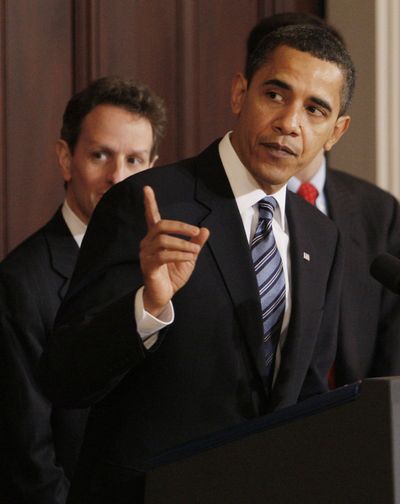Obama proposes $3.6 trillion budget
Plan tackles subsidies, adds more bailouts

WASHINGTON – President Barack Obama charted a dramatic new course for the nation Thursday with a bold but contentious budget plan proposing higher taxes for the wealthy and the first steps toward guaranteed health care for all – accompanied by an astonishing $1.75 trillion federal deficit that would be nearly four times the highest in history.
Denouncing what he called the “dishonest accounting” of recent federal budgets, Obama unveiled his own $3.6 trillion blueprint for next year, a bold proposal that would transfer wealth from rich taxpayers to the middle class and the poor.
Congressional approval without major change is anything but sure. The plan is filled with political land mines including an initiative to combat global warming that would hit consumers with considerably higher utility bills. Other proposals would take on entrenched interests such as big farming, insurance companies and drugmakers.
Obama blamed the expected federal deficit explosion on a “deep and destructive” recession and recent efforts to battle it including the Wall Street bailout and the just-passed $787 billion stimulus plan. The $1.75 trillion deficit estimate for this year is $250 billion more than projected just days ago because of proposed new spending for a fresh bailout for banks and other financial institutions.
As the nation digs out of the most serious economic crisis in decades, Obama said, “We will, each and every one of us, have to compromise on certain things we care about but which we simply cannot afford right now.”
Signaling budget battles to come, Republicans were skeptical Obama was doing without much at all.
“We can’t tax and spend our way to prosperity,” said House GOP leader John Boehner of Ohio. “The era of big government is back, and Democrats are asking you to pay for it.”
Obama plans to move aggressively toward rebalancing the tax system, extending a $400 tax credit for most workers – $800 for couples – while letting expire President George W. Bush’s tax cuts for couples making more than $250,000 a year. That would raise the top income tax bracket from 35 percent to 39.6 percent for those taxpayers and raise their capital gains rate from 15 to 20 percent as well.
Thursday’s 134-page budget submission, a nonbinding recommendation to Congress, says the plan would close the deficit to a more reasonable – but still eye-popping – $533 billion after five years. That would still be higher than last year’s record $455 billion deficit.
And the national debt would more than double by the end of the upcoming decade, raising worries that so much federal borrowing could drive up interest rates and erode the value of the dollar.
Also, to narrow the budget gap, Obama relies on rosier predictions of economic growth – including a 3.2 percent boost in the economy next year – than most private-sector economists foresee.
There is already resistance from Democrats who are upset with the budget’s plan to curb the ability of wealthier people to reduce their tax bills through deductions for mortgage interest, charitable contributions and state and local taxes.
That tax hike would raise $318 billion over the upcoming decade toward a down payment on Obama’s high-priority universal health care plan. Cuts to the Medicare and Medicaid federal health programs would supply an additional $316 billion, but that still wouldn’t provide enough money to guarantee coverage for all, and Obama wants Congress to come up with hundreds of billions of dollars in additional hard-to-raise revenues to pay for the rest.
Then there is the proposed clampdown on the Pentagon budget, which would get a 4 percent boost, to $534 billion next year, but would then get increases of 2 percent or less over the next several years. Domestic programs favored by Democrats would, on average, receive a 7 percent boost over regularly appropriated levels – even as many agencies are already swimming in cash from the just-enacted economic stimulus plan.
Taken together, Obama’s plan contains so many difficult-to-digest ideas that it’s virtually certain to be significantly redrafted during debates later this year.
“It’s going to be a tough row to hoe, but he has large Democratic majorities and a lot of popular support and we’re in times of crisis,” said Robert Reischauer, president of the Urban Institute. “So his prospects of him getting much of what he is seeking, while not good, are higher than … we’ve seen in the past.”
Senate Budget Committee Chairman Kent Conrad, D-N.D., predicted Congress would pass much of Obama’s plan, though with significant revisions. For instance, he’s unimpressed with a proposal to reduce payments to farming operations with sales above $500,000 per year.
A plan to devote up to $250 billion to support as much as $750 billion in increased spending under the government’s rescue program for banks and other financial institutions landed with a thud.
Obama’s detailed proposals for the fiscal year that starts Oct. 1, and nine years beyond, will be released in April.